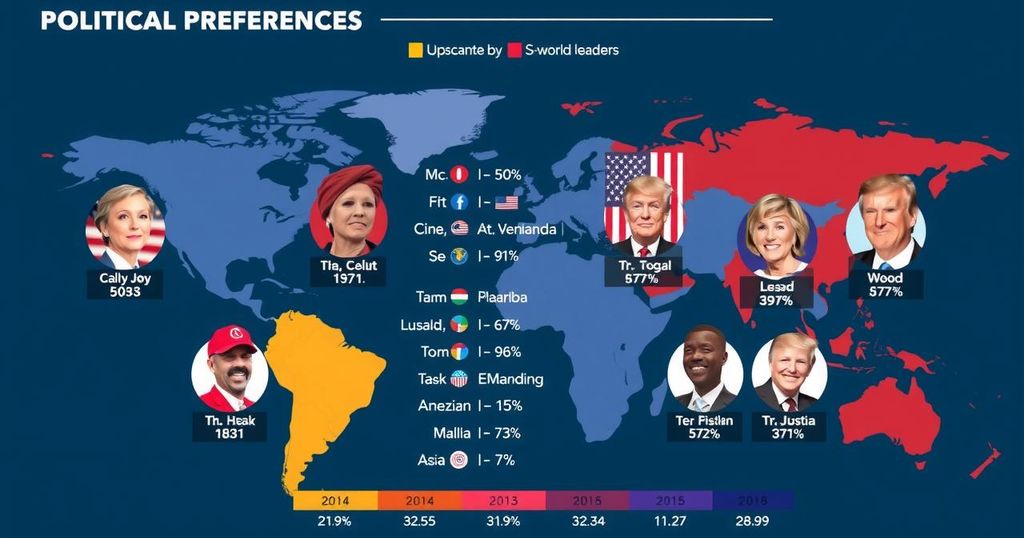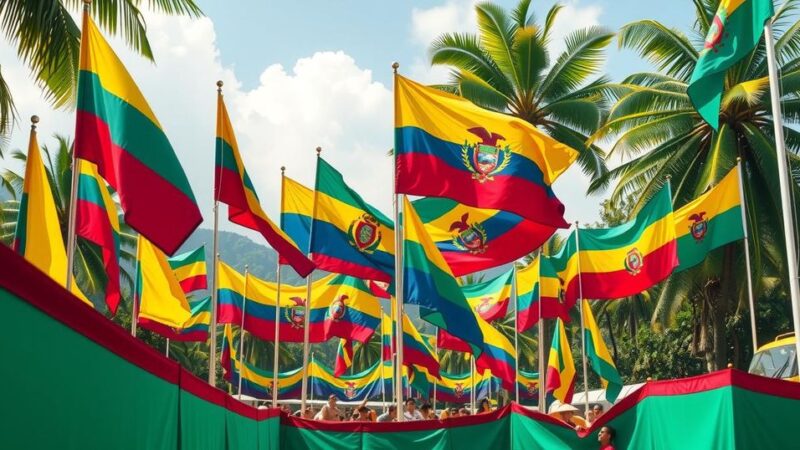As the U.S. election approaches, world leaders exhibit varying preferences between Vice President Kamala Harris and former President Donald Trump, reflecting their national interests and geopolitical strategies. Putin likely favors Trump for his leniency, while European leaders lean towards Harris. Netanyahu supports Trump, whereas China may subtly prefer Harris for continuity. Modi remains neutral, emphasizing strong U.S.-India relations, with South Korea and Japan showing concerns about Trump’s unpredictability. Australia’s apprehensions about climate policy add to the diverse international perspectives ahead of the election.
As the United States presidential election approaches on November 5, the international community keenly observes the potential outcomes between Democratic Vice President Kamala Harris and Republican former President Donald Trump, who are currently in a tightly contested race. Notably, world leaders’ preferences, influenced by their specific geopolitical interests, vary significantly regarding who they would prefer in the White House. Vladimir Putin of Russia exhibits a peculiar affection for Trump, suggesting that Trump would be more lenient regarding sanctions and military support for Ukraine. Expert Timothy Ash remarks, “Putin thinks Trump is soft on Russia and will roll over to give him a great deal on Ukraine.” In contrast, Putin has made flippant remarks about Harris, implying that she could be favorable, but many analysts believe he ultimately favors Trump’s more authoritarian style that aligns closely with his own. Conversely, Xi Jinping, the President of China, has refrained from publicly endorsing either candidate. Historically, both candidates exhibit tough stances on China, maintaining tariffs initiated under Trump. Reports suggest that Chinese officials may subtly prefer Harris due to continuity in policy rather than a Republican approach that destabilizes trade relations. Benjamin Netanyahu, Israel’s Prime Minister, appears to favor Trump due to their strong prior relationship. Statements made by both leaders during Trump’s presidency highlight their mutual admiration, despite some recent tensions after Biden’s election. Netanyahu reportedly endeavors to reinforce ties with Trump, framing him as Israel’s most supportive ally. Many European leaders express a preference for Harris, perceiving her as a stabilizing force for transatlantic relations, especially given Trump’s previous threats concerning NATO. German Chancellor Olaf Scholz has openly stated he would find Harris to be “a good president.” Harris’s alignment with Biden’s policies on climate change and international collaboration present further reasons for European leaders to support her candidacy. Narendra Modi, Prime Minister of India, maintains a neutral stance towards either candidate, reflecting a broader bipartisan consensus in the U.S regarding India’s strategic importance. Experts note, “There is a high degree of bipartisan consensus in Washington on deepening relations with India,” irrespective of who occupies the White House. In South Korea, the alliance with the U.S. has thrived under Biden. Koreans viewed Trump’s presidency with some trepidation due to his focus on defense contributions, leading to a preference for continuity with the policies enacted under Biden and now Harris. In Japan and Australia, there are mixed sentiments regarding a potential Trump victory. Japanese officials harbor concerns about increased tariffs and reduced military cooperation while Australians fear that Trump could jeopardize climate agreements. Both nations would prefer stability and predictability in U.S. foreign policy regarding Asia-Pacific relations. Overall, voter preferences in the U.S. impact not only the domestic landscape but also the global diplomatic climate, as world leaders reassess their alliances and international strategies based on whom they believe may occupy the Oval Office next.
The United States presidential election significantly affects international relations, drawing keen interest from world leaders who often have specific preferences based on their strategic interests. The approaching election pitting Kamala Harris against Donald Trump raises considerations regarding their differing views on foreign policy—particularly concerning Russia, China, Israel, Europe, and regional allies such as India, South Korea, Japan, and Australia. As both candidates present potential variations in policy direction, reactions from international leaders reflect their priorities in a changing geopolitical landscape.
The preferences of world leaders regarding the upcoming U.S. presidential election reveal the intricate ties between American leadership and global diplomacy. While Vladimir Putin and Benjamin Netanyahu express preferences for Trump, leaders from Europe appear more inclined towards Harris. Xi Jinping’s lack of endorsement reflects apprehensions shared by many world leaders regarding the unpredictable nature of U.S. foreign policy and the potential ramifications of the election outcome. As both candidates offer contrasting visions, the global focus remains on how their respective policies would shape international relations and alliances moving forward.
Original Source: www.aljazeera.com






